
Advent and Misa de Gallo
Deacon Patrick Constantino | Photos courtesy Keith Cabiles
My Homily for the first Sunday in Advent is from the Gospel of Luke 21:25-28,34-36.
Jesus said to his disciples: There will be signs in the sun, the moon, and the stars, and on earth nations will be in dismay, perplexed by the roaring of the sea and the waves. People will die of fright in anticipation of what is coming upon the world, for the powers of the heavens will be shaken. And then they will see the Son of Man coming a cloud with power and great glory. But when these signs begin to happen, stand erect and raise your heads. Beware that your hearts do not become drowsy from carousing and drunkenness and the anxieties of daily life, and that day catch you by surprise like a trap. For that day will assault everyone who lives on the face of the earth. Be vigilant at all times and pray that you have the strength to escape the tribulations that are imminent and to stand before the Son of Man.
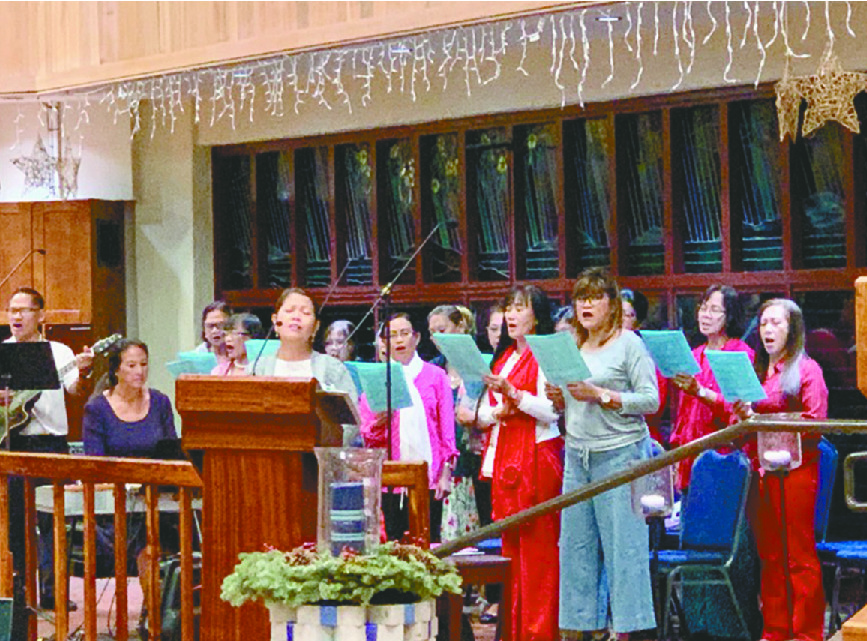
Photo courtesy Trixie Galam
Some of my guilty pleasures at this time of the year are the countless Christmas movies aired on TV. Of course, I like the classics—the ones that have stood the test of time, the ones we watch across generations. It’s a wonderful tradition many of us embrace. But it may surprise you to learn I also enjoy all those other Christmas movies—the ones that appear on channels such as Hallmark, Lifetime and ION. You know the ones I’m talking about, right?
Many of us find ourselves spending more time watching these movies than the classics. And we watch them not because they are cinematically better but for other reasons altogether.
We like them because we know how the story is going to turn out.
Am I right? There is something sort of comforting in these movies, something that helps us feel good about life, love, and family. Those of you who dislike these films feel free to roll your eyes. It’s ok. And these films are much different from most films I like. I’m usually the kind of guy who likes things a little grittier, a little more realistic. In fact, I love films that are messy, like films that don’t wind up with a story with a nice, neat bow tied around it—especially when there is a surprise ending I could never have predicted. I love when that happens.
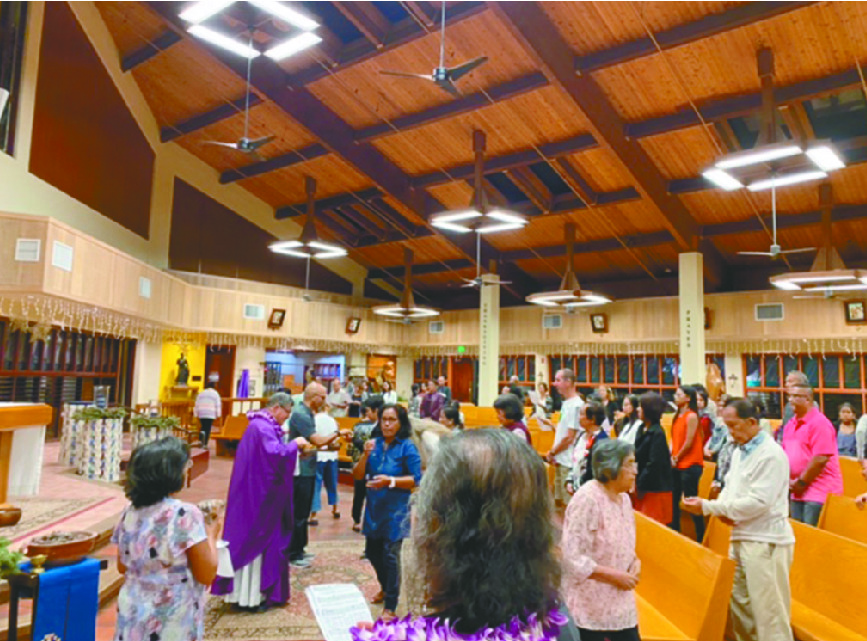
Photo courtesy Trixie Galam
But not with Christmas movies. I’m totally okay with surprises along the way but not at the end. That wouldn’t work for me. I want things to work out. I want love to win out. I want joy and hope and peace to be the feelings I am left with when the credits roll …
… Just like in life!
Today we begin Advent, begin another Church Year. And each year on this Sunday we are invited to look long-range, look down the road, look at the big picture. We are asked to begin the Church Year by considering the entirety of our lives, the entirety of our personal histories, the entirety of our faith journeys.
And Scripture does that through the New Testament words of Jesus, dramatic images that put before us a time when Jesus will return in power and great glory.
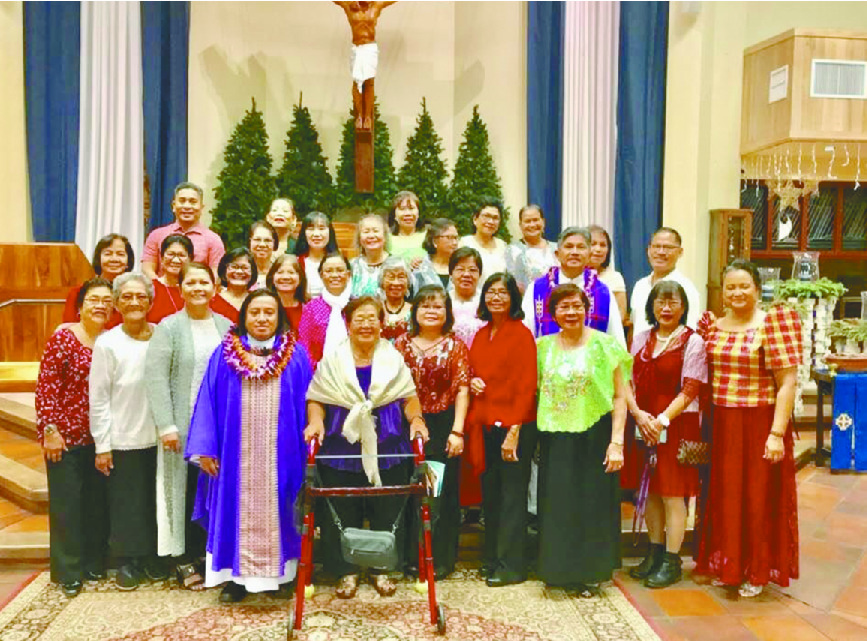
Photo courtesy Trixie Galam
These words and images can be quite startling, can be puzzling, can be frightening in a certain sense. Not one of us can really know what that day will be like or what we will experience or whether it will take place in our lifetime or long after we are gone. And we’re not supposed to know.
But what we are to know is how the story turns out—the ending if you will—the hope and promise and eternal destination of each of our individual stories.
God has a plan for his creation, and each of us gets to share in that plan, gets to participate in its unfolding, gets to travel down a path to a home prepared for us.
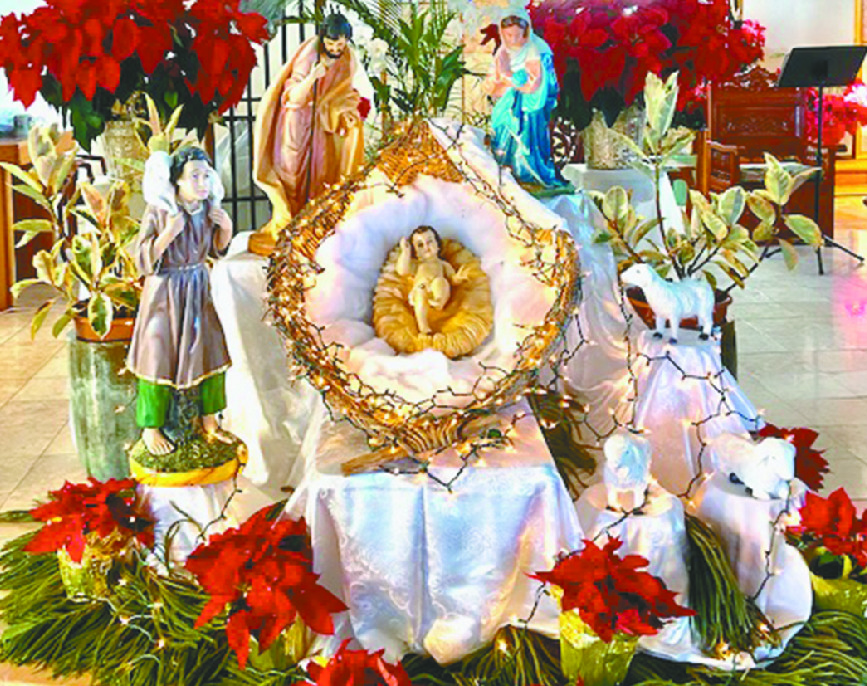
Photo courtesy Manny Baltazar
And there is deep comfort in that, comfort in knowing and believing and trusting in a God who loves us beyond our wildest dreams. And while there certainly will be surprises along the way, there will certainly be things we couldn’t have predicted, even things we never would have chosen—we need not worry about how it will all turn out, need not worry whether we have gotten enough right for God to love us.
He already does. Deeply. Relentlessly. No matter what!
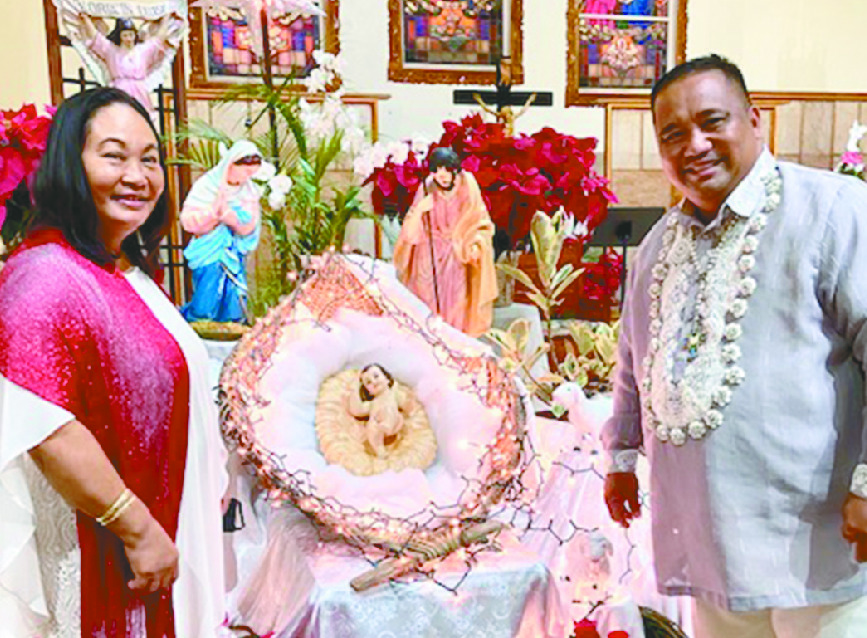
Photo courtesy Manny Baltazar
It is that same God we patiently await this Advent, that same God who didn’t only come two thousand years ago but also promises to come to us once again, promises to break into our hearts and minds and lives in ways we can’t even imagine.
But like most things in the spiritual life, the difference God wants to make in each of our lives will not happen by accident. We need to be expecting Him.
We need to be longing for Him. We need to be waiting for Him to make the difference He longs to make, need to be alert and attentive to the God who comes to us on His terms, not ours.
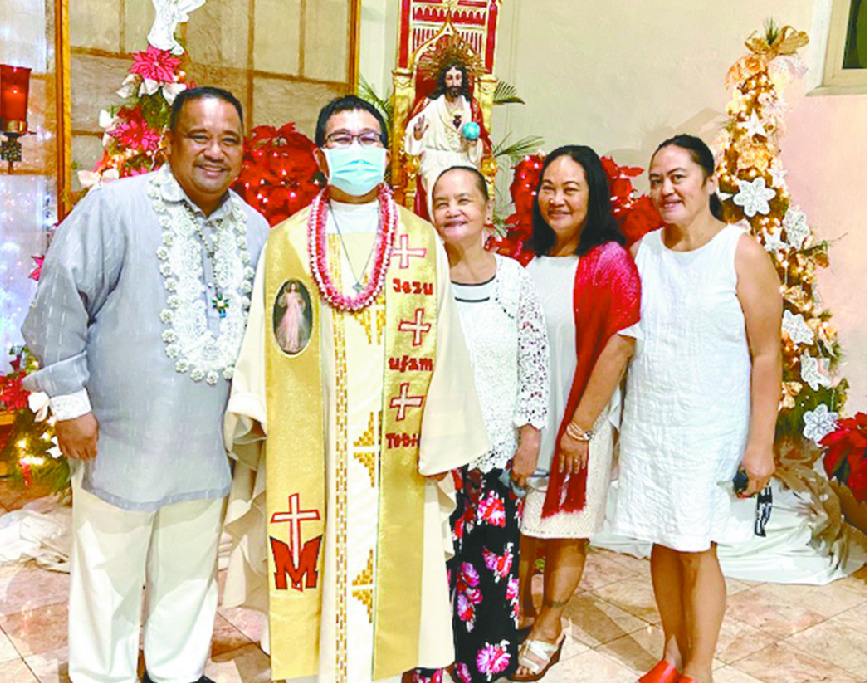
Photo courtesy Manny Baltazar
And that’s why we need this season, to remind us of the incredible God we have and the incredible things He was and is willing to do for us. It’s like watching those heartfelt Christmas movies over and over and over again, knowing how they will turn out but still needing to experience the ending again—an ending full of joy, peace, and love—the ending a life of faith assures us.
And so we once again start this holy season with our eyes fixed on two places—on a manger in a small town long ago and on the eternal home awaiting each of us, on the beginning of an incredible story and in the end, on the surprises life delivers and on the destination fixed in our minds and hopes and dreams.
Jesus is coming. Of that we can be sure. And so, may we use this holy season to truly prepare—to open our hearts to our God who wants nothing more than come to us, dwell within us, and change us forever.
I don’t know about you, but that’s a movie I could watch over and over and over again, and never get tired of it.
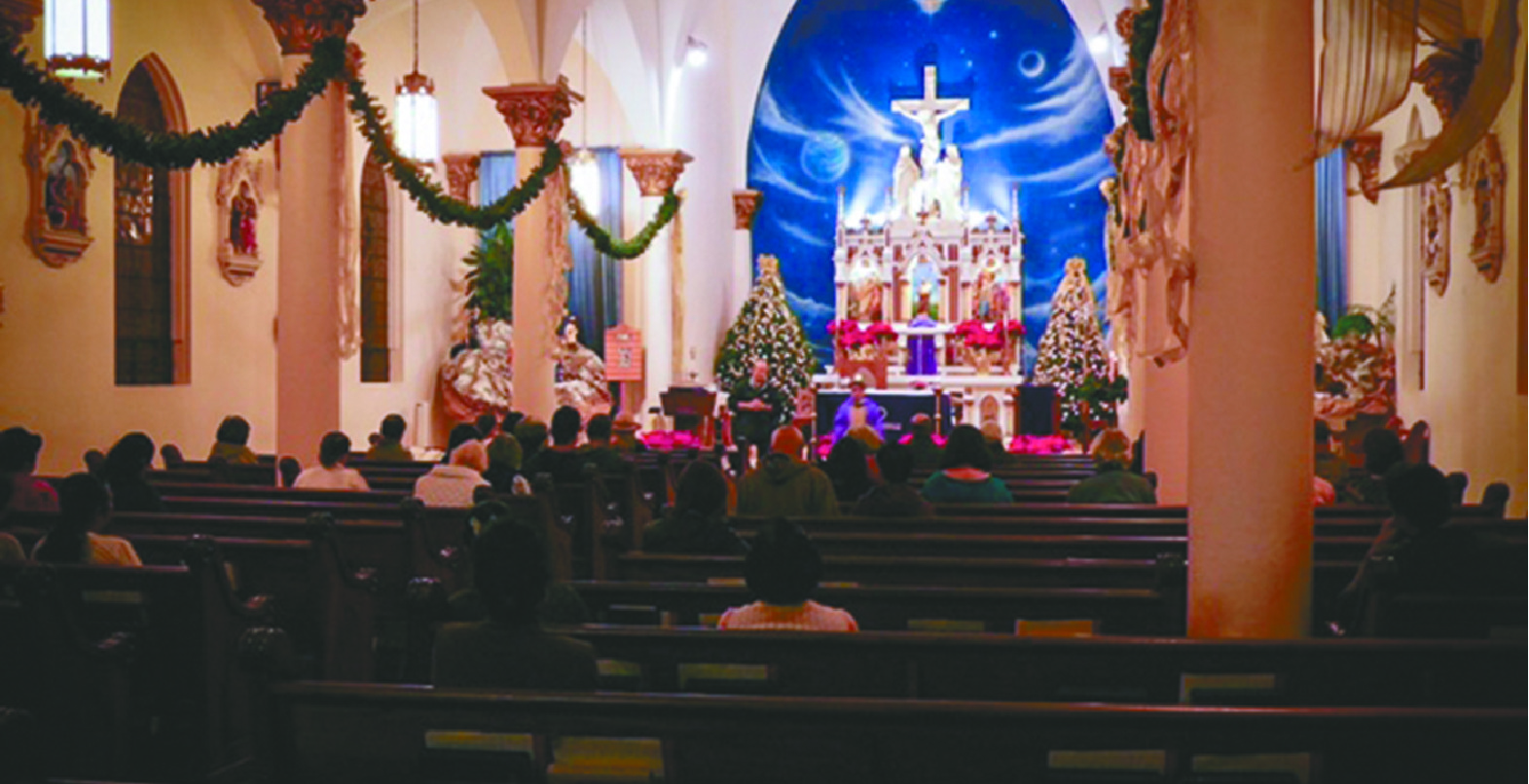
Photo courtesy Jacob Metz
As part of the beginning of the Advent celebration each year is the wonderful celebrations of our Misa De Gallo.
This is a wonderful way in our culture that I love, this celebration of Misa De Gallo! This mass is not only for the Filipino parishioners. It’s for everyone! It reflects the Spanish and Portuguese speaking people of the world. Let me explain: Misa De Gallo (pronounced MEE-sah day GAH-yoh) means “rooster’s mass” in Spanish. Both the Spanish and Portuguese speaking people of the world refer to Midnight Mass on Christmas Eve as the rooster’s mass. The Portuguese term for “rooster’s mass,” missa do gab, closely resembles its Spanish cousin. This curious name for Midnight Mass comes from a bit of old European folklore. According to a traditional tale Jesus was born at the stroke of midnight.
The task of announcing this miraculous event fell to the roosters. The first rooster fluttered to the roof of the stable and proclaimed in a human voice, “Christ is born!” The second followed, crying out, “In Bethlehem!” Since the rooster was the first creature to call humankind to worship on the eve of Jesus’ birth, people throughout the Spanish and Portuguese speaking world honor the animal by referring to Midnight Mass on Christmas Eve as the “rooster’s mass.”
Perhaps elements of this legend inspired the scheduling of Midnight Mass itself.
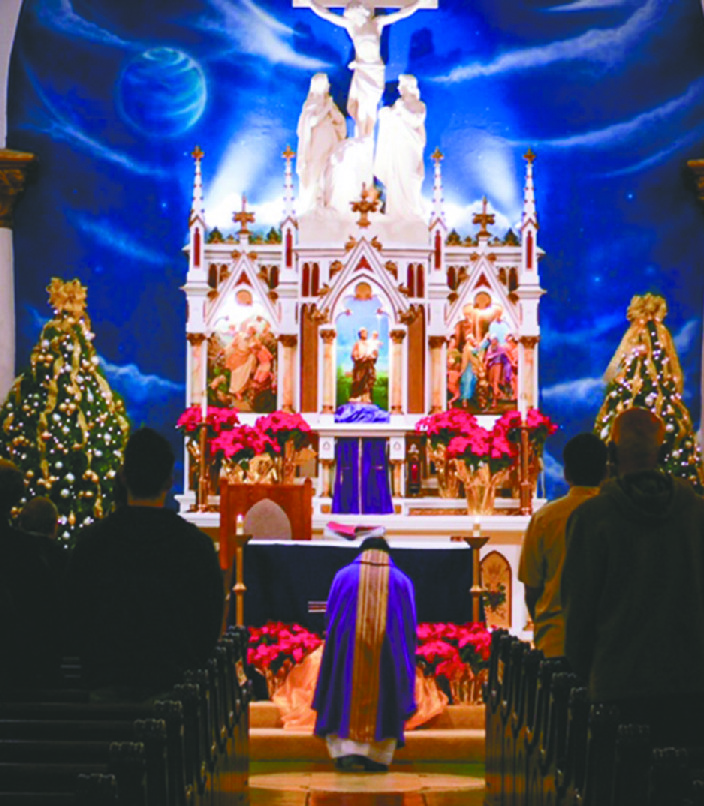
Photo courtesy Jacob Metz
Since early medieval times Roman Catholic priests have celebrated three Christmas masses. Rules dating back to the fifth century A.D. ordained the first Christmas mass be celebrated ad galli cantum, that is, when the rooster crows.
Few roosters crow as early as midnight. Instead, the belief Jesus was born at midnight determines the hour at which the first mass is held. Normally rooster’s crow about 4 a.m. and Misa De Gallo masses starts at 4 a.m.
Roman Catholic churches in the Philippines offer nine rooster’s masses on the nine nights preceding Christmas. This practice remains from colonial times. In the Philippines and other areas colonized by the Spanish, missionaries instituted a special novena for the nine days before Christmas. A novena is a prayer service offered on nine consecutive days. The missionaries deemed the novena necessary to impress upon the recent converts the importance of the upcoming feast day. In the Philippines, the Christmas novena is called Simbang Gabi, a Tagalog phrase which means “night mass.”
The Filipinos also use Spanish terms for these masses, referring to them as misas de gallo, “rooster’s masses,” or misas de aguinaldo (MEE-sahs day ah-ghee-NAL-doh), which means “Christmas present masses” or “GIFT masses.”
The “gifts” refer to the shepherds’ offerings to the infant Jesus. These nine early morning masses are also celebrated in parts of Central America and the Caribbean.
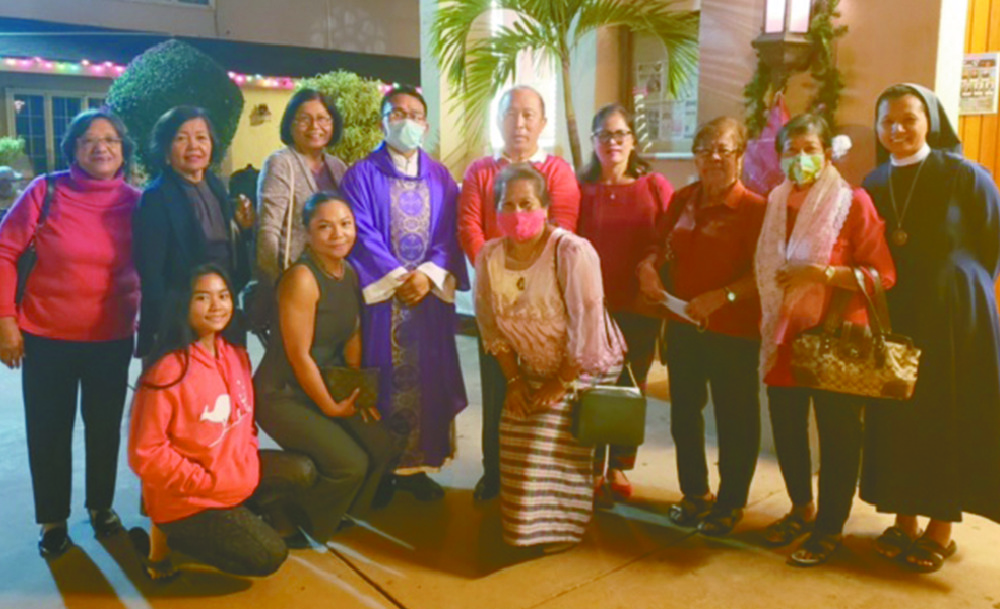
Photo courtesy Nora Takushi
In the Philippines, the rooster’s masses begin on December 16 and usher in the Christmas season. A festive rather than solemn mood pervades these observances, even though the masses begin at four in the morning. At 4 a.m. church bells ring, marching bands play and fireworks explode, rousing anyone who is still in bed and reminding everyone to attend mass.
Young people who went to parties the night before may stay out long enough to attend the masses before returning home.
After the service many stay to socialize with one another and share the traditional breakfast of salabat (ginger tea) and puto bum-bong (sweet rice cakes).
Although the last of these nine masses occurs in the early morning hours of December 24, Roman Catholic churches in the Philippines still offer Midnight Mass on Christmas Eve. But the Misa De Gallo masses are held at 4 a.m. in the morning because the roosters start crowing that early.
On Maui we have Misa De Gallo masses at:
Christ the King Church, Kahului at 5 a.m. Misa de Gallo.
Maria Lanakila Church, Lahaina at 5 a.m. Misa de Gallo.
St. Anthony Church, Wailuku at 6 p.m. Simbang Gabi.
St. Joseph Church, Makawao at 6 a.m. Misa de Gallo.
St. Theresa Church, Kihei at 5 a.m. Misa de Gallo.
Please join us in faith in welcoming our Lord Jesus Christ this Christmas! May He change us and make a difference in our lives! May God bless you and Merry Christmas everyone!
Jesus, I trust in You! Amen!
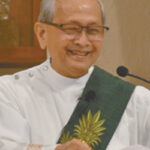 On June 18, 1987, Patrick Constantino was ordained as the first Deacon of Filipino ancestry for the Roman Catholic Church in Hawai‘i. For twenty-two years, he served as Administrator at Holy Rosary Church in Pā‘ia, St. Rita Church in Ha‘ikū and St. Gabriel Church in Ke‘anae. Constantino is presently assigned to St. Joseph Church in Makawao.
On June 18, 1987, Patrick Constantino was ordained as the first Deacon of Filipino ancestry for the Roman Catholic Church in Hawai‘i. For twenty-two years, he served as Administrator at Holy Rosary Church in Pā‘ia, St. Rita Church in Ha‘ikū and St. Gabriel Church in Ke‘anae. Constantino is presently assigned to St. Joseph Church in Makawao.
Prior to his ordination, Constantino was in government—first appointed in 1966 as Assistant Sergeant of Arms by the Speaker of the House Elmer F. Cravalho. When Cravalho became Maui’s first Mayor, Constantino became his Executive Assistant—the first of Filipino ancestry. Later, Constantino became the first County Treasurer of Filipino ancestry and the first County Grants Administrator and Risk Manager of Filipino ancestry.
Constantino has served as a Deacon for thirty-four years and married to his lovely wife Corazon for sixty years.
